The United States government on Tuesday announced plans to increase tariffs on a range of Chinese products across several “strategic sectors,” including electric vehicles (EVs), steel and aluminum, semiconductors and solar cells.
Will the United States impose additional measures targeting products made in Mexico by Chinese companies or goods shipped from China to the U.S. via Mexico?
“Stay tuned” was the message United States Trade Representative Katherine Tai conveyed to reporters on Tuesday.
Ambassador Tai attended a White House press briefing after United States President Joe Biden directed her to increase tariffs on US $18 billion of imports from China (see below).
As soon as the floor opened to questions, a reporter noted that major Chinese EV company BYD is planning to establish a manufacturing presence in Mexico, and asserted that the cars it makes south of the border “could flood the U.S. market” — even though the automaker itself says it has no intention of exporting to the United States.
“Why isn’t the administration preemptively announcing tariffs to hit these vehicles?” the reporter asked.
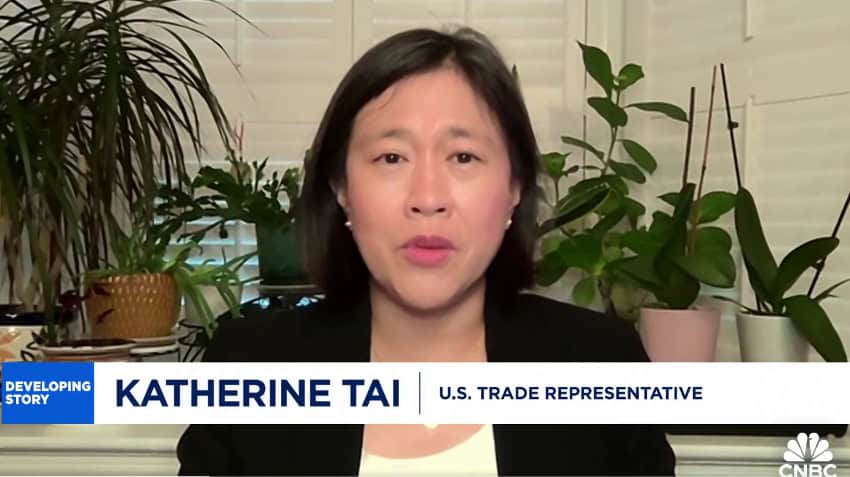
After expressing concern about BYD’s presence in Mexico – “at USTR, that is exactly what we are built to worry about” – Tai said that measures aimed at made-in-Mexico Chinese EVs, or other products made here by Chinese companies, “will require a separate pathway.”
“This is about imports from China. What you’re talking about would be imports from Mexico. Equally important — something that we were talking to our industry, our workers, and our partners about. And I would just ask you to stay tuned,” she said.
Later in the briefing, the trade representative was asked whether her “stay tuned” remark could be interpreted as her saying that “there could be some changes” to the United States-Mexico-Canada Agreement (USMCA) rules, which are up for review in 2026, or “to the law that would allow the U.S. to apply tariffs on goods from China that originate in Mexico or other third countries?”
“What I’m saying is the fact pattern that’s developing is one that is of serious concern to us and that, at USTR, we are looking at all of our tools to see how we can address the problem,” Tai responded.
The USTR, as the trade representative’s office is known, subsequently said that it could take several actions other than tariffs to stop China using Mexico as a workaround.
According to an Associated Press report, the office noted that there are provisions within the USMCA to “address unfair subsidies and efforts to avoid import duties.”
Donald Trump, who could be back in the White House in less than eight months, apparently favors tariffs. He said in March that he would impose a 100% tariff on cars manufactured in Mexico by Chinese companies if he wins the upcoming United States presidential election.
How will the new tariffs announced by the United States affect Mexico?
Before considering the question above, let’s take a closer look at the tariffs announced by the U.S. government. The largest tariff increase is that for EVs made in China, with duties set to increase from 25% to 100% this year.
Tai said on Tuesday that “after thorough review of the statutory report on Section 301 tariffs, and having considered my advice, President Biden is directing me to take further action to encourage the elimination of the People’s Republic of China’s unfair technology transfer-related policies and practices that continue to burden U.S. commerce and harm American workers and businesses.”
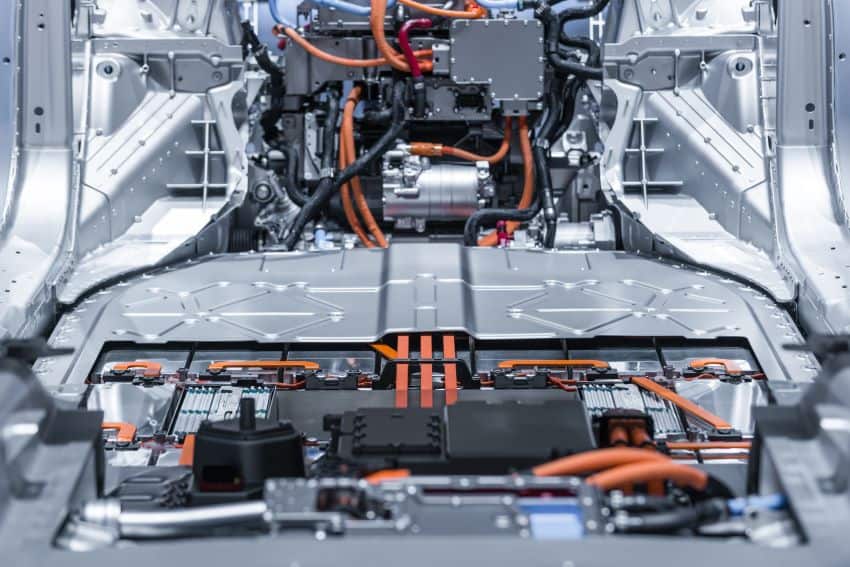
“… While the [current] tariffs have been effective in encouraging the PRC to take some steps to address the issues identified in the Section 301 investigation, further action is required. In light of President Biden’s direction, I will be proposing modifications to the China tariffs under Section 301 to confront the PRC’s unfair policies and practices,” she added.
In a statement, the USTR said that “Ambassador Tai will propose the following modifications in strategic sectors:”
- Battery parts (non-lithium-ion batteries): Increase rate to 25% in 2024.
- Electric vehicles: Increase rate to 100% in 2024.
- Face masks: Increase rate to 25% in 2024.
- Lithium-ion electrical vehicle batteries: Increase rate to 25% in 2024.
- Lithium-ion non-electrical vehicle batteries: Increase rate to 25% in 2026.
- Medical gloves: Increase rate to 25% in 2026.
- Natural graphite: Increase rate to 25% in 2026.
- Other critical minerals: Increase rate to 25% in 2024.
- Permanent magnets: Increase rate to 25% in 2026.
- Semiconductors: Increase rate to 50% in 2025.
- Ship to shore cranes: Increase rate to 25% in 2024.
- Solar cells: Increase rate to 50% in 2024.
- Steel and aluminum products: Increase rate to 25% in 2024.
- Syringes and needles: Increase rate to 50% in 2024.
Those increased tariffs will provide Mexico with the opportunity to further increase its exports to the United States, according to Gabriela Siller, director of economic analysis at the Mexican bank Banco Base.
“The stronger the trade war between the United States and China, the more potential Mexico has to export to the U.S. market,” she told the El Economista newspaper.
Mexico has also already dethroned China as the top exporter of goods to the United States, sending products worth more than US $475 billion to the U.S. last year. Tariffs imposed on China by the Trump administration and maintained by the Biden administration are seen as the main factor that allowed Mexico to dislodge China from the top spot.
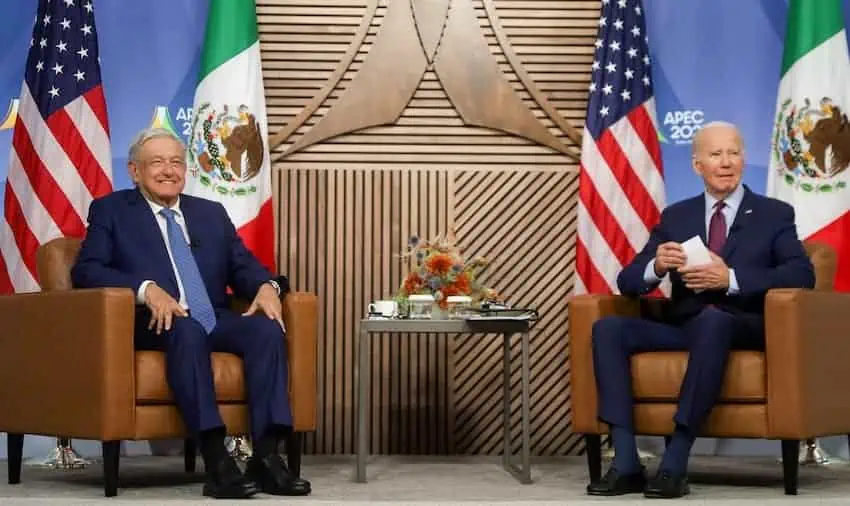
El Economista acknowledged that the new tariffs announced by the United States on Tuesday are primarily designed to benefit companies in the U.S.
However, “countries like Mexico could obtain secondary gains,” the newspaper said before noting that that the United States’ North American trade partners will benefit from a stronger industrial sector in the U.S. due to the integration of supply chains in the region.
One of the sectors in which Mexico and the United States are seeking to increase integration is semiconductors. United States authorities said in March that the U.S. would partner with Mexico in a new semiconductor initiative whose ultimate aim is to strengthen and grow the Mexican semiconductor industry.
Siller noted that Mexico is well placed to benefit from the increased U.S. tariffs on Chinese goods due to its proximity to the United States and because of the USMCA, which allows most Mexican exports to enter the U.S. market duty-free.
But — as Tai indicated — goods made in Mexico by Chinese companies may not enjoy tariff-free status in the U.S. market at some point in the not-too-distant future. Such a scenario would appear to be of significant concern to Chinese companies that have established a manufacturing presence in Mexico to circumvent tariffs imposed by the Trump administration.
Mexico gives China “a back door” into the United States because, along with the U.S. and Canada, it is party to the USMCA, The Economist reported last year. But that door, judging by Tai’s comments, is currently swinging in the wind and could slam shut — or at least be heavily reinforced with protectionist measures — very soon.
Among the Chinese companies with Mexican operations that would be affected by U.S. protectionist measures aimed at them are auto-parts manufacturers that supply U.S.-based automakers.
Will the United States’ higher tariffs work? Stopping rerouting through Mexico will be key.
Following the U.S. government’s announcement of new tariffs on a range of Chinese goods, Reuters reported that “U.S. officials and trade experts say that without strong efforts to cut off transshipped or lightly processed Chinese goods from Mexico and other countries, China’s underpriced excess production will still find its way into U.S. markets.”
Eswar Prasad, trade policy professor at Cornell University and a former China director at the International Monetary Fund, told the news agency that “the new tariffs might keep out imports from China but it is likely that much of those imports could be rerouted through countries not subject to the tariffs.”
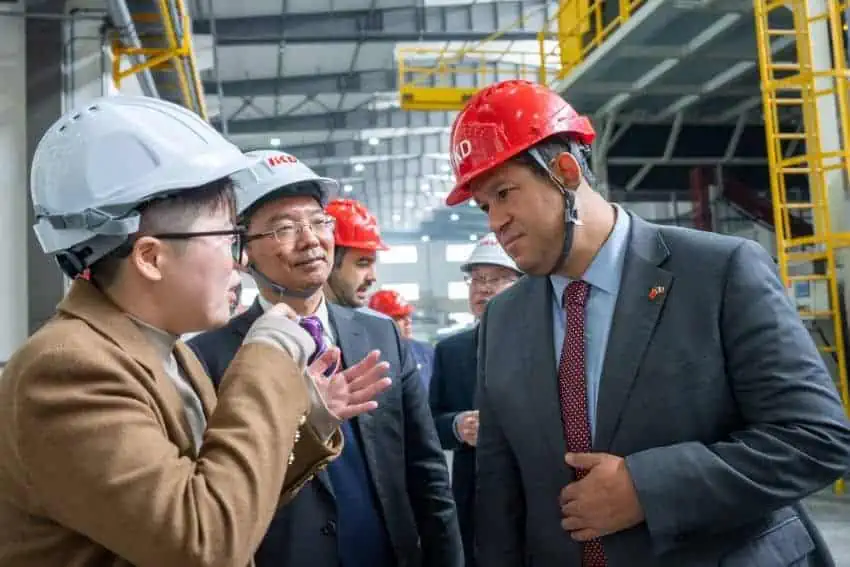
He said that Mexico and Vietnam have benefited from the United State-China trade war, and remarked that both countries need to avoid the “ire” of the U.S. government while they continue to seek benefits from Chinese manufacturing investment.
Mexico is thus in something of a catch-22 situation. President Andrés Manuel López Obrador has said that Chinese investment in welcome, but his government late last year reached an agreement with United States government to cooperate on foreign investment screening, a move that appeared to be motivated to a large degree by a desire to stop problematic Chinese investment in Mexico.
In addition, Mexico last month implemented new tariffs on hundreds of imports from countries with which it doesn’t have trade agreements – another move that appeared mainly directed at China.
The implementation of new tariffs by the Mexican government came amid growing concern in the United States about Mexico becoming a transshipment hub for Chinese goods headed to the U.S.
In a meeting with Mexico’s Economy Minister Raquel Buenrostro in February, Ambassador Tai, according to a USTR statement, “stressed the urgent need for Mexico to take immediate and meaningful steps to address the ongoing surge of Mexican steel and aluminum exports to the United States and the lack of transparency regarding Mexico’s steel and aluminum imports from third countries.”
USTR Senior Advisor Cara Morrow told Reuters that the trade agency has been speaking with Mexican officials about ways to reduce the routing of Chinese steel and aluminum through Mexico to the United States.
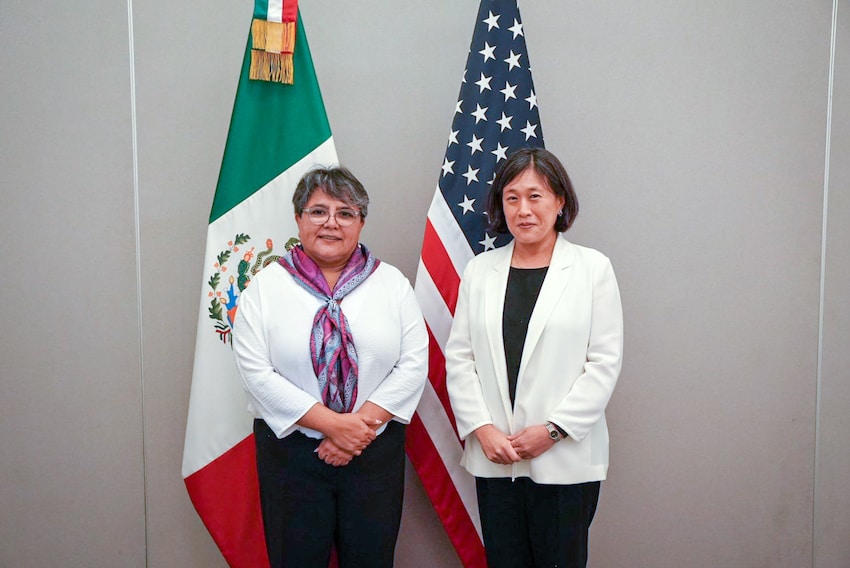
She said that U.S. officials have stressed to their Mexican counterparts that the aim of the USMCA is to promote North American integration and competitiveness, “not to provide a back door to China.”
For his part, William Reinsch, a trade expert at the Center for Strategic and International Studies in Washington, told Reuters that attempting to block Chinese excess production “is like squeezing a balloon.”
“It shrinks in one place and pops out in another,” he said.
BYD reacts to the tariffs announcement
In late February, BYD’s Americas CEO Stella Li confirmed the company would build a plant in Mexico, and asserted it will only make vehicles for the Mexican market here.
“Our plan is to build the facility for the Mexican market, not for the export market,” she said.
Li said that officials in Mexico had been receptive to BYD’s plans to build a factory here.
However, Mexican officials who spoke with Reuters last month said that pressure from the United States had led the Mexican government to refuse to offer incentives to Chinese EV manufacturers planning to invest in Mexico. “Welcome to the country,” Mexico appears to be saying, “but don’t expect us to do anything for you.”
As for the higher tariffs announced by the United States on Tuesday, Li said they won’t have any impact on BYD.
“We don’t have plans to go to the U.S. market, so this announcement does not impact us at all,” she said.
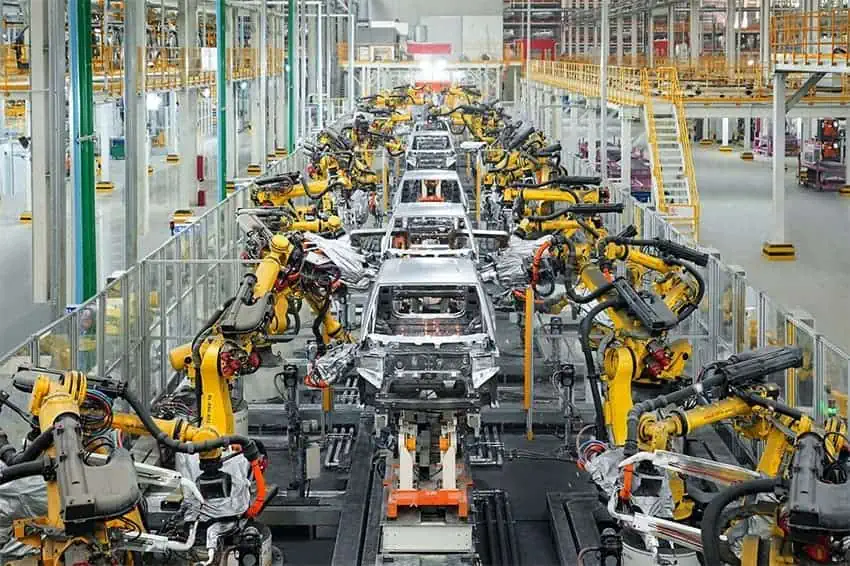
“When we build a Mexican plant, we only consider the Mexican market and other countries’ markets, we have not considered the U.S.,” Li added.
Currently, very few Chinese vehicles are exported to the United States, a status quo the U.S. is clearly determined to maintain.
Reuters reported that in the first quarter of 2024 “Geely was the only Chinese automaker to export to the United States with 2,217 cars, according to data from the China Passenger Car Association.”
With regard to the planned BYD plant in Mexico, Li said there is a shortlist of potential sites, but explained that “deeper dialogue” was needed before a final decision could be made.
The plant is expected to have the capacity to make 150,000 vehicles per year.
Li said that BYD hadn’t discussed incentives with the Mexican government, and didn’t disclose any incentives the company is seeking from federal or state authorities. However, she indicated that she expected that authorities in Mexico – despite what the officials told Reuters last month – will be willing to roll out the red carpet for BYD, the world’s largest EV company by sales in the final quarter of 2023.
“I think all the states will try their best to give a best offer to attract us because we will be bringing a lot of technology there and create a lot of local jobs. Every state, and even the central government, would love this kind of investment,” Li said.
With reports from Reuters and El Economista